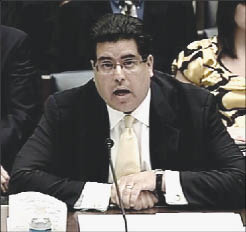 |
|
Justice Under Oath: J. Robert Flores testifies last month before a House committee, saying allegations about his grant selections “are false.”
Photo: House Committee on Oversight |
The World Golf Foundation wasn’t used to this hassle. After years of winning millions of dollars in congressional earmarks for its youth program, The First Tee, the foundation found itself struggling last year to complete the federal government’s grant application process under deadline pressure – just like any regular organization competing for money.
So the foundation asked for help. In stepped J. Robert Flores, administrator of the Office of Juvenile Justice and Delinquency Prevention (OJJDP) and an avid golfer who had played with foundation officials on their dime. With a grant deadline just days away, Flores had his top administrators meet with the executive director of The First Tee, then directed his staff to help the organization overcome hurdles to rush in its application for a competitive bid – a bid that staffers were told World Golf would win, even before they reviewed any proposals.
How World Golf and other well-connected organizations got OJJDP grants is among the stories that have emerged from a congressional investigation into OJJDP’s grant making, which led to a public hearing last month. Testimony, e-mails and other documents gathered by the House Committee on Oversight and Government Reform show that Flores and his top administrators met with select bidders and helped some apply for grants, which drew lectures from higher-ups and stirred discomfort among his staff.
One Justice Department official wrote Flores a scathing e-mail, telling him that “bending the rules” to help some grant applicants “is not defensible.”
Flores and his supporters say he simply used his authorized discretion in giving out money to worthwhile programs. “These are called discretionary grants for a reason,” Rep. Tom Davis (R-Va.) said at the hearing.
The controversy revolves around the National Juvenile Justice Program grants, for which OJJDP received 104 bids last year and gave out 10 grants, totaling $8.6 million. Most of the bids that were scored the highest by OJJDP staffers did not get grants, while several programs were funded even though they scored lower than dozens of programs that were not.
Central to the controversy is how much discretion agency administrators have. The answer is: a lot. Although Flores’ detractors have charged that he broke federal rules or laws in the grants process, the House committee has not claimed that with its allegations so far.
The dispute is whether Flores abused his discretion and damaged the integrity of the competitive bidding process. “Your actions cast a taint over the entire process,” Rep. Elijah Cummings (D-Md.) told Flores at the hearing. “The appearance is that the playing field is not level.”
Who Got Time With Flores?
The willingness of Flores to meet with potential grantees and direct his staff to help them stands in contrast to his unwillingness to meet with others, and to unofficial policy at OJJDP. It also caused some consternation among his staff.
Last March, Lisa Pion-Berlin, CEO of California-based Parents Anonymous, called OJJDP to request a meeting with Flores in Washington in early April. A staffer responded that Flores “was not available to meet with her,” nor was Associate Administrator Ron Laney, according to a subsequent e-mail from the staffer to Laney.
That e-mail reminded Laney that this very issue “had been addressed a few weeks ago,” when Flores’ chief of staff, Michele DeKonty, declared that if anyone from Parents Anonymous was going to get a meeting with OJJDP, it “would happen at the program manager level.”
Later in March, however, a “parent leader” from the organization met Flores at an event at the National Press Club in Washington and got an agreement from Flores to meet with Pion-Berlin. She called OJJDP the next day to set up the meeting.
Word got back to Laney, who e-mailed Flores about the issue, which had arisen before: “Bob, staff is concerned that we are not consistent in our messages to earmark grantees. Per our understanding, these calls were to be handled by Program Managers and to protect you from folks beating down your door by saying that you are not available. Is this correct? Open door for one and others will follow.”
Some see the inconsistency as evidence that Flores played favorites with grant applicants. “You were directing your staff to provide assistance that you weren’t providing to others,” Cummings told Flores at the oversight committee hearing last month. “It is a question of a level playing field. It is a question of fairness.”
“I try to meet with anyone” who might want help in applying for grants, Flores said.
Flores did not meet with Pion-Berlin. Her organization’s application scored an average of 89.5, ranking it 24th. It was not funded.
Flores’ Defense
Flores sat alone at the witness table in the congressional hearing room and calmly but steadfastly defended himself against accusations that he awarded competitive grants based on favoritism and political connections. “Each one of those allegations is false,” he said.
He said the allegations were based on misunderstandings of the grants process and political opposition to his selections. Several Republican members of the committee concurred. “What we have is a disagreement over your decisions,” said Davis, the Republican congressman from Virginia.
Flores said the scores the reviewers on his staff gave to the applicants for the National Juvenile Justice Program grants were advisory. He noted that:
• Each of the reviewers scored only a few of the 104 bids, and therefore did not know how their applicants stacked up against most of the others.
• The reviewers did not take into account such matters as whether the Justice Department is funding similar projects, whether the bidder gets OJJDP money under other grants, and what the agency’s priorities are.
Rather, Flores said, the scores were intended to give him a pool of qualified applicants, from which he could make selections, based on the department’s priorities and his knowledge of the field.
|
|
|
Cummings: “The playing field is not level.”
Photo: House of Representatives |
Some high-scoring bids proposed activities that were similar to what the department was already funding elsewhere, he explained. He said other bidders were already getting federal grants, and he wanted to fund a diverse group of bidders. Both are common reasons for government agencies to turn down grant applications.
“If I only looked at the scores, there would be no need to have an administrator for this office,” Flores said.
He noted that he presented his choices in a memo to Assistant Attorney General Regina Schofield, who oversaw OJJDP at the Office of Justice Programs. Schofield, who has left the Justice Department, has said Flores misled her by stating that certain groups ranked first, second or third in specific categories, such as school-based efforts to prevent pregnancy, although she later learned that those groups ranked as low as 51st overall.
Flores said he created those categories only as an organizational device, to group the applicants by the areas on which they focused. His memo to Schofield, however, cites those categories in justifying the grants.
Rep. Henry Waxman (D-Calif.), chairman of the oversight committee, said all of the current and former Justice Department staffers and officials who spoke with the committee during its investigation said the process for selecting the grants was not fair or transparent. “It seems that you are the only person at the Department of Justice who thinks your process was fair, transparent and served the taxpayers,” Waxman said.
Davis said critics are just angry that Flores didn’t fund the organizations that they prefer. “This hearing,” he said, “is little more than an attempt to earmark by oversight.”
More on the Web: Youth Today’s ongoing OJJDP coverage includes:
• Breaking Web-only stories
• Past print and online articles
• Links to documents uncovered in the investigation
• Video of the congressional hearing
Connections: World Golf Foundation
The Background: Through congressional earmarks, the World Golf Foundation had received more than $3.5 million in noncompetitive funding from the departments of Justice and Education from 2003 through 2005. But Congress cut off virtually all earmarks in fiscal 2007, leaving the foundation with no federal money for its youth program, The First Tee.
Connections: Among other connections, OJJDP Administrator J. Robert Flores attended The First Tee’s three-day annual conference in Florida in February 2006, and played a round of golf with foundation officials, without paying. That could violate federal ethics rules against accepting gifts from organizations that do business with the government.
Flores did pay, eventually. At the hearing last month of the House Committee on Oversight and Government Reform, Rep. Elijah Cummings (D-Md.) displayed on a huge video screen a receipt from World Golf showing that Flores paid $159 – on June 18, 2008, the day before the hearing. His voice rising, Cummings asked, “Why would you wait until yesterday to pay for a round of golf two years ago?”
Flores said he unexpectedly had been invited to play during the conference, he offered to pay at the time but “they were not set up” to take money, and his staff to had to ask repeatedly for the foundation to send an invoice.
(According to the committee’s report, Flores told committee staffers during an interview on June 16 that he had already paid, but “there were questions about the paperwork that may be on file.”)
In early 2007, Flores met with the executive director of The First Tee, Joe Louis Barrow Jr., in Washington, according to the committee report. They spoke about The First Tee and OJJDP grants. On March 7, Barrow wrote a letter to Flores to thank him for the meeting and to provide “anecdotal information regarding The First Tee’s impact in low-income communities.”
Those anecdotes were descriptions of eight program sites, with no information about their impact. The letter pointed out that two of the programs taught sexual abstinence. It also described several of the programs as serving low-income, minority youth – part of an effort to show that The First Tee, which had served mostly white, middle-class youngsters, was branching out. The letter said most of the youth in a Louisiana program “have never seen a $20 bill” and that many of the Native Americans in a Montana program “had never been to a golf course in their life.”
Help: Soon after Flores’ meeting with Barrow, Jennifer Weiler, a senior director at The First Tee, got in touch with OJJDP Program Manager Gwen Williams. “Thank you for your help in getting them connected,” Barrow wrote to Flores.
The public solicitation for organizations to apply for the National Programs grant went out on May 17. On June 6, Barrow met with key people at OJJDP to talk about applying for grants: Chief of Staff Michele DeKonty and Deputy Administrators Greg Harris and Nancy Ayers. Barrow later e-mailed DeKonty to say, “It was more fortunate we had our meeting, w/o such we might have completely missed the deadline” for the grant, which was closing in fast: June 8.
Few organizations can find out about and submit a federal grant application in two days. Weiler, the senior director at The First Tee, set out to apply for the grant through http://Grants.gov, the federal government’s online site for applicants to submit bids. But because The First Tee hadn’t gone through this process to get federal money before, it was not registered at the site. Getting registered takes three to five days.
At 7:35 a.m. on June 7, Barrow e-mailed DeKonty asking for help; Weiler did the same at 8:04 a.m. “If there is anything that can be done to help expedite that process we would be very grateful,” Weiler wrote. DeKonty forwarded the e-mail to Flores and Harris, one of the deputy administrators.
Federal officials aren’t supposed to try to overcome this barrier; that was made clear in a subsequent e-mail to Flores from Beth McGarry, deputy assistant attorney general for operations and management at the Office of Justice Programs, which oversees OJJDP. She noted that the registration procedure is spelled out in the grant solicitations, and that the Justice Department had gone through pains not to let anyone circumvent that process.
“It is critical for the integrity of the competitive process that all applicants are treated the same and that we do not bend the rules” for anyone, she wrote.
McGarry was writing about a different grant program, under which Flores and DeKonty had let faith-based organizations apply for grants after the deadline.
For World Golf, Flores and DeKonty “directed program staff” to help the foundation prepare its application, according to the committee report. “It was made clear that we had to … work with World Golf and make sure that they got their application in,” Associate Administrator Jeff Slowikowski told the House committee, its report states. “We needed to … assist them.”
It is not clear how, but the leaders at OJJDP whisked The First Tee past the regular http://Grants.gov process. Less than two hours after the deadline passed on June 8, Slowikowski e-mailed an agency administrator: “World Golf made the http://grants.gov deadline. Requesting $3.0 million which I am certain we are funding because Michele has said as much.”
When the committee sought to interview DeKonty, she took the Fifth Amendment against self-incrimination, the committee reported.
The proposal: The two OJJDP staffers who evaluated The First Tee’s bid gave it an average score of 82, putting it 47th among the 104 applications. One of the evaluators was Gwen Williams, whom Flores had told First Tee to contact before submitting its bid. A spreadsheet of the scores marked this bid with an NR, for “not recommended.”
Among the reviewers’ comments: The proposal “does not lead into how funding would advance juv justice. … Stats only support ethnic breakdown of youth involved in golf; stats do not focus on the problem. … Logical model was clear and succinct.”
Regina Schofield, the assistant attorney general at the Office of Justice Programs, who had to approve Flores’ grants, later told the committee, “I did not like their scores. It was … one of those organizations that I thought was kind of weak. And I didn’t see them serving a large population of at-risk kids. And I had a candid conversation with him [Flores] about that.”
Flores countered that he knew the organization, that “they had broadened the number of kids that they were going to reach every year, and it was within his discretion to give them money,” according to the committee report. Schofield told the committee: “And so I let him use that discretion to make that award.”
Funded: The First Tee won $500,000 for one year.
Flores stressed to the committee that the program was going to serve more at-risk kids. “They are now really able to move into really needy areas,” he said.
Davis, the Virginia congressman, said at the hearing that Congress earmarked funds to The First Tee for years, so it had little business now lambasting Flores for funding the same group.
Connections: Victory Outreach Special Services
Background: Victory Outreach Special Services, based in San Dimas, Calif., is a social services component of Victory Outreach International, which describes itself as a “church-oriented Christian ministry called to the task of evangelizing and discipling the hurting people of the world.” It oversees a network of faith-based community organizations.
For this grant, it paired with Urban Strategies LLC, a consulting firm based in Arlington, Va., and run by Lisa Cummins. Cummins formerly worked in the White House Office for Faith-Based Initiatives. On its website, the firm says it was “a key architect” in the design of the President Bush’s Compassionate Capital Fund at the Department of Health and Human Services [HHS].
Connections: On March 16 last year, Cummins met with Steven McFarland, director of the DOJ Task Force for Faith-Based and Community Initiatives, “regarding funding opportunities for her clients,” the committee report states. Soon thereafter, McFarland sent OJJDP Administrator J. Robert Flores a memo recommending that he meet with Cummins.
“I recommended that she contact you regarding Victory Outreach,” the memo states. It goes on to state that Cummins worked with the White House Faith-Based office, “so I know you will find her a great asset to the work of JJDP.”
While e-mails at OJJDP refer to efforts to set up a meeting, it is not clear whether one took place.
The proposal: The bid proposed that Victory Outreach operate programs in eight communities to help “Hispanic boys that are the most vulnerable to delinquency because of multiple personal, family and community risk factors.” The services would include tutoring, mentoring, community service and vocational training.
Urban Strategies would oversee the grant, taking 32 percent of the proposed $3 million. The program manager at Urban Strategies was to be Kelly Cowles, a former program manager in the Compassion Capital Fund at HHS.
The bid ranked 41st, with an average score of 84. A spreadsheet of the scores marked this bid with an NR, for “not recommended.”
Victory Outreach had never run such a program this large, and its latest available federal tax returns, for 2005, list total income that year of $124,000. The reviewers were concerned, with one writing, “There may be cause to question whether [Victory Outreach] has the capacity to manage a project of this magnitude.”
Funded: The proposal was funded at $1.2 million over three years. In September of last year, Cummins and Flores met at a White house conference on faith-based initiatives. Flores later “asked his staff to meet with Ms. Cummins to work on a revised budget proposal,” according to the committee report.
Victory Outreach later turned down the money, saying it didn’t have the capacity to carry out the project.
Connections: Best Friends Foundation
Background: In 2004, Best Friends – a school-based program that strives to steers girls from substance abuse and sexual activity – won a three-year, $754,785 Community Based Abstinence Education grant through the U.S. Department of Health and Human Services (HHS). In a major setback, however, the HHS grant was not renewed last year.
Writing in last winter’s edition of “Heart to Heart,” a magazine-style publication by Best Friends, foundation President Elayne Bennett called the decision “sad and mystifying.”
Connections: OJJDP Administrator J. Robert “Flores had frequent personal contacts with the Best Friends Foundation and its founder, Elayne Bennett,” the House Committee on Oversight and Government Reform’s report stated. It is not clear how frequent. Bennett disputed that description in a brief phone conversation, saying she has met Flores only about five times. (She declined repeated requests by Youth Today for interviews over the past six months.)
In 2005, Flores provided a mildly supportive blurb for a Best Friends report about the program’s effectiveness.
In April of last year, Bennett called Scott Peterson, an OJJDP program manager, to say she had recently had lunch with Flores and that “he advised her to apply for funding from OJJDP and that the competitive announcement for such funding would be out soon,” according to an e-mail from Peterson to the committee. Via e-mail, Peterson added that Bennett also “told me that she spoke to Michelle DeKonty [Flores’ chief of staff] on the phone.”
Peterson said he understood the call to mean he was to help Best Friends with its application.
Also that month, Flores, his wife and his special assistant attended a $500-a-plate Best Friends fundraiser for free. (Flores got approval from Justice Department lawyers.)
The proposal: The two evaluators of the Best Friends bid gave it an average score of 79.5, placing it 51st out of the 104 bids. A spreadsheet of the scores marked this bid with an NR, for “not recommended.”
Among the reviewer comments: Overall goal is clear, but “objectives are not quantifiable,” “does not provide evidence of successful implementation,” and although one goal was to replicate the program in six cities, “the sites chosen are already in varying degrees of operation.”
OJJDP documents show that several grants were turned down because they proposed to fund ongoing operations.
One of the reviewers later told the oversight committee: “That effort was not responsive to the solicitation. … It was clear that they were looking for money to … fill gaps in an existing budget.”
In the “Heart to Heart” article last winter, Bennett noted, “This grant will enable us to keep half of our school programs alive in Washington, D.C., and selected replication sites.”
Funded: In explaining the three-year, $1.1 million grant, Flores told the committee, “I’ve made an effort to focus on girls,” partly because of reports about rising female delinquency.
On June 6, Flores presided over the release of an extensive OJJDP-funded study that found that that while girls are being arrested more than ever, crime by girls has not changed over the past two decades. (See Research of Note, August 2008.)
Flores told the committee that Best Friends was “doing a tremendous job keeping girls in school, keeping girls from getting pregnant.”
After controversy erupted over the grant, Bennett got a rare invitation: She, a Best Friends administrator and a local judge were given one hour to talk about Best Friends at a quarterly meeting of the Coordinating Council on Juvenile Justice and Delinquency Prevention. With OJJDP staffers in attendance – it was the same meeting at which the girls’ crime study was released – Bennett made a PowerPoint presentation about what Best Friends does and its effectiveness.
While Best Friends has paid for outside experts to evaluate it, the program declined to participate in the federal government’s largest independent, long-term evaluation of sexual abstinence programs.


































